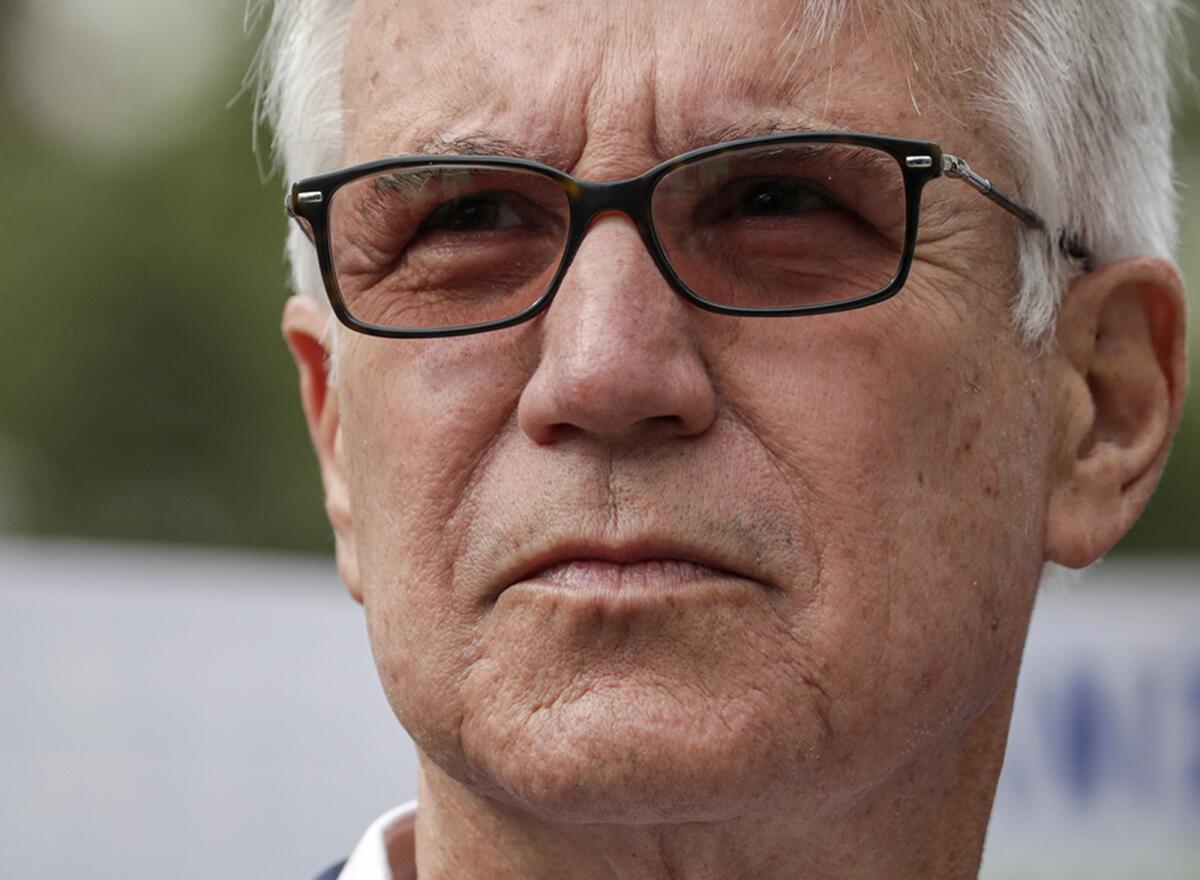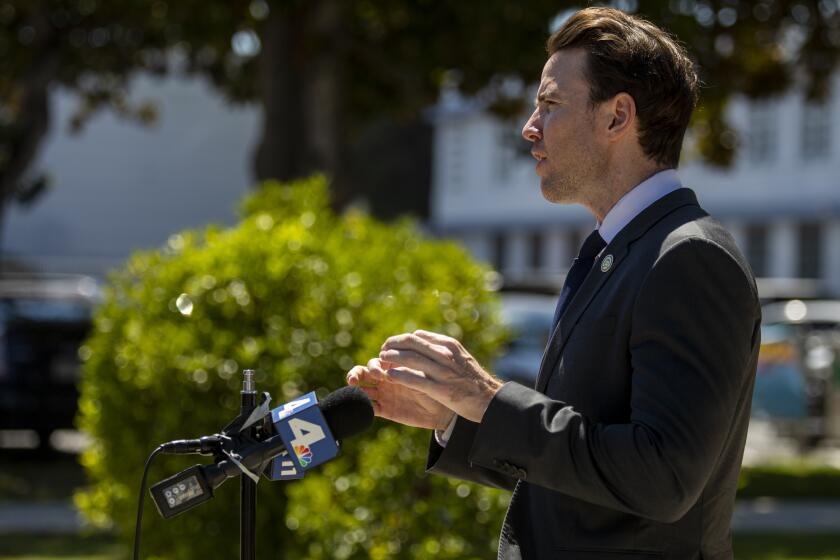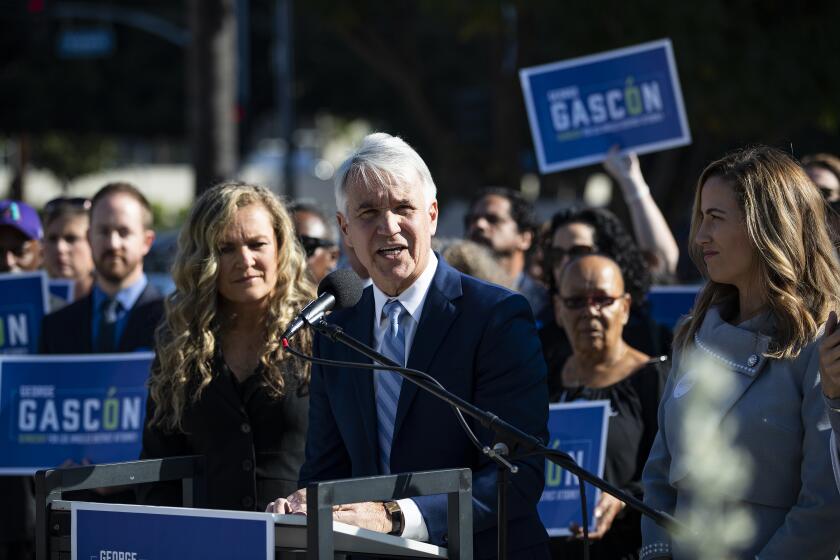Editorial: Anti-Gascón drive extends era of destructive, distracting recall mania

The final tally of verified signatures on petitions to recall Los Angeles County Dist. Atty. George Gascón is expected within days. If county officials report that there are at least 566,857 valid, nonduplicative signatures among the 715,833 collected since Jan. 27, voters will be asked to weigh in on Gascón for the second time in two years — and the distracting, destructive season of California recalls will stretch on.
The D.A. has become the latest vessel into which residents wrestling with anxiety over disease, lockdowns, political turmoil, violence and societal disruption have poured their fears — and into which opponents of criminal justice reforms, and opportunists of various political stripes but most notably from the far right, have placed their hopes.
A similar dynamic played out in the attempted recall last year of Gov. Gavin Newsom, which culminated in the governor’s landslide retention by voters on Sept. 14. On June 7, San Francisco Dist. Atty. Chesa Boudin was recalled after a campaign that blamed him for a supposed wave of violence and property crimes in the city — even though crime actually dropped during Boudin’s tenure.
Boudin was a high-profile target of justice reform opponents, in part because his city is a leading bastion of progressive politics, and in part because his parents were convicted of killing police officers in the 1980s, making him a potent symbol for police, prosecutors and others who feel threatened by criminal justice policies that depart from the status quo.
Three bills to roll back or repeal Proposition 47 are grounded in fear and falsehoods and should be rejected.
Gascón, by contrast, is himself a former police officer, having spent most of his career in the Los Angeles Police Department, before serving as chief of police in Mesa, Ariz., and San Francisco.
To many in the movement to roll back reform, that background makes Gascón an even bigger target than Boudin, because his reform orientation smacks of professional betrayal. That’s the charge inevitably leveled against reformers in any field who through experience and reflection identify flaws in the system of which they are a part and commit to fixing them.
L.A. County voters have repeatedly expressed their desire for a crime-and-punishment system that is more just, more equitable, more efficient and more constructive. They voted against the death penalty in 2016 as the rest of the state retained it. They supported reforms like Proposition 47 (co-written by Gascón), which ended felony charges for simple drug possession and adjusted the line separating misdemeanor and felony property crimes (although it’s still far easier to charge felony theft in California than in supposedly tough-on-crime states like Texas and South Carolina). They elected Gascón to protect and extend those and other reforms, as well as to hold police accountable for criminal misconduct — a job to which he brings particular professional insight.
The increase in crime in Los Angeles County is real and deeply troubling, and requires an official and meaningful response from government. Crime is frightening and corrosive even to people who are not directly affected. Increases in violence and theft over the last two years parallel nationwide trends and are minuscule when compared with the crime wave of the 1990s, but those facts do not lessen the public’s legitimate desire for safety.
Yet the notion that it’s the prosecutors — not the police, the mayor, county supervisors and other players or criminal laws and policies regarding health, economics, education — that control crime is fairly new and somewhat odd. The D.A.’s role comes on the back end of a case, after the rest of government has failed and a criminal defendant has been arrested and accused. A D.A. making charging decisions can begin the slow process of making the system more responsive and equitable over a course of many years. But the notion that a D.A. can make crime rise or fall over a period of months is absurd.
Just as it was wrong for judicial powers to be reallocated to prosecutors in the “tough on crime” era, it is wrong for judges to usurp powers properly in the prosecutor’s ambit – what crimes to charge, and what punishments to seek.
If the recall against Gascón qualifies for the ballot, the process won’t operate like the one required by the combined city-county charter in San Francisco, where voters booted out the D.A. and the mayor filled the vacancy.
The L.A. County charter calls for the process to follow state law, as in the attempted recall of Newsom, with replacement candidates on the same ballot as the yes-or-no question to remove Gascón. If the gubernatorial recall is a guide, it’s likely that most of the replacement candidates will offer a 180-degree reversal of the direction Gascón and voters have set.
We will know shortly whether Los Angeles County voters must spend the next three months arguing yet again over reforms they have endorsed again and again — or whether their district attorney will be allowed to continue putting them in place.
More to Read
A cure for the common opinion
Get thought-provoking perspectives with our weekly newsletter.
You may occasionally receive promotional content from the Los Angeles Times.












